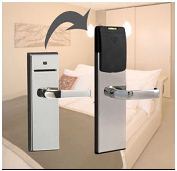|
September 2012
Article
AutomatedBuildings.com
|
[an error occurred while processing this directive]
(Click
Message to Learn More)
|
Retrofitting
Locks to Provide Greater Security Through Next Generation
Technologies
Today’s travelers are looking to hotels to provide unparalleled
security with unprecedented ease of access.
|

George Winker
Vice President Sales North America,
VingCard Elsafe |
 Innovations in hotel
locking have been moving full speed ahead since
the world’s first mechanical card lockset was introduced in 1979. Door
locks with recordable pre-punched keycards replaced metal cutout keys
in hotels around the world, providing greater security for guests and
operational benefits for individual properties. As time passed, the
mechanical card lockset that was once thought to be cutting-edge was
replaced with magnetic stripe key systems. Today, new technology has
allowed for even greater advances in locking with Radio Frequency
IDentification (RFID) and Near Field Communications (NFC) options.
Innovations in hotel
locking have been moving full speed ahead since
the world’s first mechanical card lockset was introduced in 1979. Door
locks with recordable pre-punched keycards replaced metal cutout keys
in hotels around the world, providing greater security for guests and
operational benefits for individual properties. As time passed, the
mechanical card lockset that was once thought to be cutting-edge was
replaced with magnetic stripe key systems. Today, new technology has
allowed for even greater advances in locking with Radio Frequency
IDentification (RFID) and Near Field Communications (NFC) options.
While magnetic, or magstripe, locking systems are still in use at many
hotels, in 2006 forward thinking properties began to replace magstripe
locks with RFID-based locks. One reason for replacing magstripe with
RFID is that guests carrying smart phones and other magnetic objects
can unintentionally erase the code on magstripe keycards. This results
in guests coming back to the front desk to get new keys on a regular
basis. De-magnetized keys and other problems experienced with magstripe
keys take away from guests’ experience and create additional workload
for hotel staff.
Soon after being introduced to the market, RFID locks proved to be more
durable and reliable while providing greater security flexibility, and
fast became the industry standard. Solutions, like VingCard Elsafe’s
Signature RFID lock, provide a powerful anti-cloning solution for
hotels complete with audit trail.
Increased security aside, RFID locks are also a step in the right
direction for hotel properties affected by weather and environmental
factors. Door locks that are subjected to extreme temperatures,
moisture from rain or snow, and salty air for nearby beaches are more
likely to have mechanical malfunctions as internal components are
compromised. RFID locks provide contactless hotel room entry for
guests, keeping mechanics completely encased. This results in a
dramatic reduction of time spent dealing with lock maintenance.
With all the benefits to RFID locks, it makes sense that hotel
operators would retrofit systems to incorporate this new technology
into their properties. The challenge for many operators is finding the
right time to schedule the retrofit project. Outside of cost, the
largest concerns are always the disruption to operations and
inconveniencing their guests. The best way to keep these concerns from
becoming a reality is to schedule the retrofit installation during
previously planned interior renovations or during the area’s slow
season for tourism. If hotel reservations are being made for the
retrofitting period, reservation agents should inform guests of the
impending upgrades during the time of booking.
Looking to the future, RFID locks are already being upgraded to work in
conjunction with NFC-cell phone technology. Several contactless
services, such as payments, ticketing and loyalty, have already been
integrated into mobile phones. The same development is now taking place
in the lock industry with access control and keys. VingCard Elsafe RFID
locks are designed to be easily adapted to Near Field Communication
technology that enables travelers to use mobile devices as virtual
guestroom keys.
[an error occurred while processing this directive]NFC is
expected to be in widespread use globally during the next
decade. The application holds potential access control as well as
mobile payments and ticketing. It is estimated that NFC support for
mobile devices will increase to the point that by 2016 46% of smart
phones will be NFC-enabled.1
Today’s travelers are looking to hotels to provide unparalleled
security with unprecedented ease of access. By retrofitting existing
locking systems to keep pace with RFID and NFC solutions, hoteliers can
provide guests with technology that caters to both demands.
About the Author
George Winker is Vice President of Sales for VingCard Elsafe / North
America. A 20-year electronic-security industry veteran, he is
responsible for overseeing all sales activities for the company’s North
American operations, including VingCard Elsafe and TimeLox hotel
security solutions, as well as Orion energy management systems. Prior
to his current position, Winker served as vice president of key
accounts and vice president of business development for VingCard
Elsafe. He also previously served as vice president of customer service
for the company, and was responsible for ensuring that the department
team was effectively meeting customers’ needs.
References
1 Near
Field Communication (Nfc)Market Global Forecast &Analysis
(2011-2016)By Products: http://www.marketresearch.com/MarketsandMarkets-v3719/Near-Field-Communication-Nfc-Global-6788903/
footer
[an error occurred while processing this directive]
[Click Banner To Learn More]
[Home Page] [The
Automator] [About] [Subscribe
] [Contact
Us]
